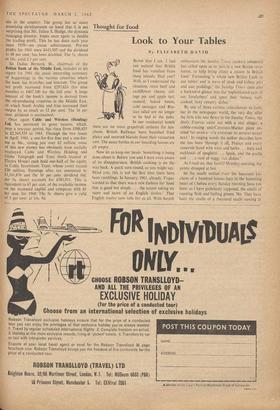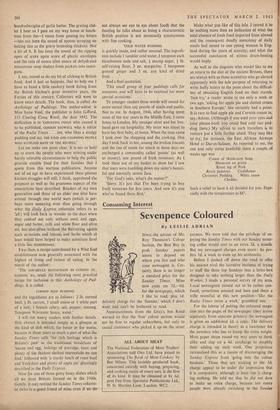Thought for Food
Look to Your Tables
By ELIZABETH DAVID
Now let us keep our heads. Something is being done about it. Before you and I were even aware of its disappearance, British cooking is on the way back. A quick turn-round, as you might say. Mind you, this is not the first time there have been rumblings. In January, 1961, already, Vogue warned us that there was a new fashion for 'food that is good but simple . . . the accent taking on more and more of an English timbre.' That English timbre now tolls for us all. With boyish enthusiasm the Sunday Tin:es cookery columnist has called upon its to 'join in a new British revo- lution, to help bring about a return to British food.' Foreseeing 'a whole new British Look to our tables' and 'a wave of steak and kidney pies and suet puddings,' the Sunday Times casts also a backward glance into the 'sophisticated eyes of our forefathers' and upon their 'honest, well- cooked, lusty country dishes.'
By one of those curious coincidences so fami- liar in the newspaper. world, the very day after the little kite was flown in the Sunday Times, the Daily Express came out with a real stinger, a rabble-rousing anti-Common-Market piece en- titled 'NO SNAILS—I'M STICKING TO HONEST ROAST BEEF.' In ringing words the author describes how she has been 'through it all, France and every casserole laced with wine and herbs ... Italy and sackloads of spaghetti ..., Spain, and the paella and.... a rash of soggy rice dishes.'
As I read on, that fateful Monday morning. the penny dropped at last.
So the smells wafted from the basement kit- chens of a hundred houses here in the humming heart of Chelsea every Sunday morning have not been, as I have guilelessly supposed, the smells of roasting flesh and boiling greens. No. They have been the smells of a thousand snails stewing in
hundredweights of garlic butter. The grating clat- ter I hear as I pass on my way home at lunch- time from the—I mean from posting my letters —has not been the sound of spoons scraping on baking tins as the gravy browning thickens. Not a bit of it. It has been the sound of the ripping open of score upon score of plastic envelopes and the rain of ounce after ounce of dehydrated minestrone soup shaken from packets into sauce- pans.
I, too, intend to do my bit of sticking to British food. And it just so happens, that to help me I have to hand a little cookery book dating from the British kitchen's great inventive years, the Forties of this century. Collectors will want to know exact details. The book, then, is called An Anthology of Puddings. The author-editor is Miss' Irene Veal; the publisher is John Gifford, 113 Charing Cross Road; the date 1942. The dedication is to 'CHRISTINA FOYLE Who caused it to be published, GORDON STOWELL who is editor of the Radio Times . . . MM, who likes a stodgy pudding and ALL THE KIND AND CHARMING PEOPLE WHO SUPPLIED MANY OF THE RECIPES,' Let me make one point clear. It is not to hold up to scorn the people who were striving under barely tolerable circumstances to help the public provide eatable food for their families that I quote from this wartime publication. Anyone not of an age to have experienced these piteous kitchen struggles will still, I think, apprehend the poignant as well as the gruesome aspects of the concoctions here described. Readers of my own generation and those of an older one who have existed through two world wars (which is per- haps more annoying even than going through what the Daily Express columnist refers, to as 'all') will look back in wonder to the days when they cooked not only without meat and eggs, sugar and butter, milk and white flour and olive oil, but also often without the flavouring agents such as 'onions and lemons and herbs which at least would have helped to make substitute food a little less monotonous.
First then, a recipe contributed by a West End establishment now generally associated with the highest of living and richest of eating. In the words of the author: 'The MIRABELLE RESTAURANT IN CURZON ST., LONDON, WI, sends the following most practical recipe for inclusion in this Anthology of Pud- dings. It is called CORNED BEEF PUDDING and the ingredients are as follows: 2 lb. corned beef, I lb. carrots, 1 small onion or 1 white part of a leek, 1 branch celery, salt, pepper, nutmeg. Teaspoon Worcester Sauce, water.'
I will not weary readers with further details. This extract is intended simply as a glimpse at the kind of dish which, for better or for worse, became in those years as much a part of what the Sunday Times calls 'the rich heritage which is Britain's past' as the traditional breakfasts of !bacon and egg, lashings of porridge, toast and plenty of the thickest darkest marmalade we can find,' followed with 'a sturdy lunch of roast beef and Yorkshire and plenty of apple pie' gloatingly described in the Daily Express.
Now for one of those gutsy busty dishes which all we stout Britons feasted on in the 1940s. Gently, it may remind the Sunday Times column- ist (who is a good friend of mine even if we do not always see eye to eye about food) that the feasting he talks about as being a characteristic British pastime is not necessarily synonymous with fine cooking.
'COLD WATER PUDDING is quickly made, and rather unusual. The ingredi- ents include 1 tumbler cold water, 1 teaspoon each bicarbonate soda and salt, / teacup sugar, / lb. self-raising flour, 3 oz. margarine, 2 teaspoons ground ginger and 3 oz. any kind of dried fruit. . .
And a final quotation.
'This small group of four puddings calls for tomatoes, and will have to be reserved for more special occasions.'
To younger readers these words will sound far more unreal than any prattle of snails and paella. Not to me. In August, 1946, after having spent most of the war years in the Middle East, I came home to London. My younger sister and her hus- band gave me hospitality. My sister was about to have her first baby, at home. When the time came I took over the shopping and the cooking, One day I took back to her, among the broken biscuits and the tins of snoek for which in those days we exchanged a commodity called 'points' (as well as money), one pound of fresh tomatoes. As I took them out of my basket to show her I saw that tears were tumbling down my sister's beauti- ful and normally serene face.
For God's sake, what's the matter?'
'Sorry. It's just that I've been trying to buy fresh tomatoes for five years. And now it's you who've found them first.' Make what you like of this tale. I intend it to be nothing more than an indication of what the total absence of fresh food imported from abroad and the consequent deadly monotony of daily meals had meant to one young woman in Eng- land during the years of scarcity; and what the successful conclusion of witless drum-beating would imply.
As well as the jingoists who would like to see us return to the diet of the ancient Britons, there are always with us those eccentrics who go abroad apparently with the sole purpose of returning to write huffy letters to the press about the difficul- ties of obtaining English food on their travels. 'Just try,' a reader wrote to me only a week or two ago, 'asking for apple pie and clotted cream in Southern Europe.' She certainly had a point. It is rare to find apple pie and Cornish cream in, say, Athens. (Although if you used your eyes and your phrase-book you could find cold rice pud- ding there.) My advice to such travellers is to venture just a little farther afield. They may like to try, for instance, the East African Airways Hotel at Dar-es-Salaam. As reported to me, the one and only menu available there a couple of weeks ago was
Cream of Mushroom Soup Macaroni au gratin Roast leg of Pork Roast potatoes. Cauliflower Christmas Pudding. White sauce Cheddar
Such a relief to have it all decided for you. Espe- cially with the temperature at 88°.



































 Previous page
Previous page